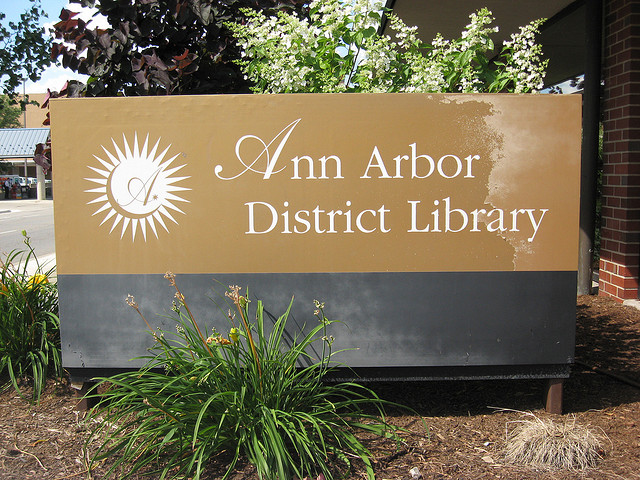A2Politico: AADL Bond Proposal #2?
Please Note: Katherine Griswold is the Chair of The Ann Arbor Independent’s Editorial Board.
by P.D. Lesko
THE ANN ARBOR District Library Board members have clearly not given up on the idea of razing the main library on Fifth Avenue and then spending, perhaps, $100 million dollars to build a new downtown library, or so say Ann Arbor residents who make it their business to attend and speak at AADL Board meetings, FOIA AADL Board member emails, and pour over AADL contracts and finances.
Actually, the last time the members of the Library Board decided to pursue a bond, the math was so fuzzy it raised numerous red flags.
In September 2008, Ann Arbor District Library Director Josie Parker told the Ann Arbor News it would cost $71 million to raze and replace the downtown library. Four years later, she claimed the same plan to raze and replace library would cost $65 million. In September 2008, Parker told the public it would cost $65 million to renovate the existing building. In 2012, she claimed it would cost $58.8 million to renovate the existing building. Parker never explained how the same 2008 plan, which had never been costed out, was pitched to the public as costing millions less four years later. According to those pesky economists at U.S. Department of Labor, a $71 million dollar project (say, oh, the construction of a new library) completed in 2008 would have cost $76.3 million dollars in 2012, taking into account a 7.5 percent rate of inflation.
Another obstacle to the bond proposal was that the Library leaders elected to ask voters to ok a $65 million dollar bond without having a design for the proposed building. There were scads of ideas, such as a catering kitchen and a cafe, but no definitive design. Critics called the bond proposal a “blank check.” As a rule, taxpayers frown on blank checks.
In the end, the bond proposal—supported by loads of political bigwigs and a PAC that took in $70,000— hit a block of voters the size of an iceberg and sank. The response from the AADL Board members? Obviously, they hadn’t explained the project to voters well enough. The people didn’t understand. Once taxpayers understood, they’d support a new downtown library.
Supporters of the failed tax hike to pay for the Percent for Art program said virtually the same thing when that proposal went down in flames.
In order to help addled Ann Arbor voters “understand,” the AADL Board has hired communications firm Allerton-Hill Consulting for $28,000 to help spiff up the organization’s “communication strategy.” The expenditure has aroused suspicions.
In June 2013, a few months after the Allerton-Hill contract was awarded, Katherine Griswold, whose PAC Protect Our Libraries worked to defeat the AADL Board’s 2012 bond proposal, filed a Freedom of Information Act request for emails between library board members about the Allerton-Hill contract. At the Board’s June meetings, a member of the public, Bob Rorke, a former member of the Ann Arbor Board of Education, suggested Allerton-Hill is a political consulting firm.
Rorke told the AADL Board members, “In reviewing the Allerton Hill proposal’s first two objectives, this was listed as number one—provide high quality survey research on voter attitudes on the library—its voter attitudes, not patron attitudes. The second objective is to offer high quality, long term messaging and targeting so that the Ann Arbor District Library is successful in its public initiatives. By public initiatives, I assume we are talking about ballot proposals and possibly bond proposals.”
Critics also point out that while AADL Board meeting dates and times are publicized (by The Ann Arbor Independent, for starters) committee meetings, at which a quorum is not present, are held outside the view of the public. Around the same time the Allerton-Hill contract was approved, the AADL created a special communications committee.
Since 2009, AADL revenues have fallen from $15 million dollars per year to $11 million dollars per year, according to the organization’s 990 federal income tax forms. That’s a drop of 25 percent, an amount which would scare the smocks off of most library directors. While the amount collected annually from library fines ($445,000) remains steady thanks to absent-minded readers, donations to the AADL are down. Despite falling revenues, in March 2013, AADL Board members elected not to increase the library millage paid by taxpayers. It doesn’t take a $28,000 consultant to realize that hiking taxes and then trying to convince voters to approve a bond they’re previously rejected would be like dosing the kids with cod liver oil. Again.
The Library Board has taken over $1.1 million dollars from its fund balance (savings) since 2010, and the entity’s profitability is a razor thin $227,222 on revenues of $11.7 million, or just under 2 percent. It’s unclear how the AADL would handle upwards of $100,000,000 dollars in debt and the associated payments, including interest. That amount is equal to ten times the AADL’s current annual revenue. One way to make bond payments would be to increase the AADL’s operating millage, ask for an supplemental millage or even close branches.
It’s important to point out that the AADL Library Board and Director Josie Parker have protected the amount spent on materials each year, about $1.8 million dollars, and as annual revenues have slid downward, the AADL Board has reduced the pay of the library’s top administrators, according to 990 tax forms filed with the IRS.
However, it’s particularly troubling that the AADL Board continues to (what appears to critics) quietly pursue a spectacularly expensive capital project in the face of falling revenues. Spending on legal and accounting fees in 2011, during the run up to the bond proposal, tripled. That’s money which could have been used to pay staff, provide programming and purchase materials.
The AADL Board members invested in a robust branch system. Alas, they can’t have their cake and a ground-up, shiny new $100,000,000 million dollar Fifth Avenue main library, as well.

